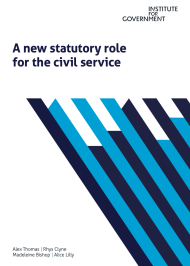
The civil service urgently needs a new statutory role to clarify its purpose, reinforce its standing, enhance its accountability, and to strengthen the partnership between ministers and civil servants upon which government depends.
This report sets out, for the first time, a 14-clause statute – to be the basis of an Act of Parliament – which provides a statement of the civil service’s permanence, its values, its objectives and how it should be run and held to account. This includes the creation of a civil service board, to be chaired by the most senior cabinet minister apart from the prime minister, and giving the head of the civil service the authority to set a direction for the civil service and to manage its day-to-day operation.
The statute would help address the civil service’s lack of clear identity, and defined responsibilities, which is one of the obstacles to the UK government becoming more effective. Nobody, including the prime minister or the head of the civil service, has the necessary authority and available time required to lead and manage the civil service. A new statutory role would define accountability within the civil service, and between ministers and officials, avoid unnecessary mistakes, blame games, improve long-term planning and help governments better learn important lessons.
The report is published alongside a second new paper, Better policy making, which sets out reforms to help address the chronic short-termism, lack of policy knowledge and poor cross-government working which has seen successive governments fail to grip long-standing policy difficulties like regional inequality, the supply of homes and social care.
Better policy making calls for stronger accountability for policy advice, decisions and outcomes, more diverse and expert civil service teams, and a strengthened Cabinet Office – to agree the government’s policy programme and hold departments to account. A new Office of the Prime Minister, and Steve Barclay’s move to be chief of staff to the prime minister while retaining ministerial duties at the Cabinet Office, is an opportunity for reform, but complex new reporting arrangements and a weak prime minister makes confusion likely.




